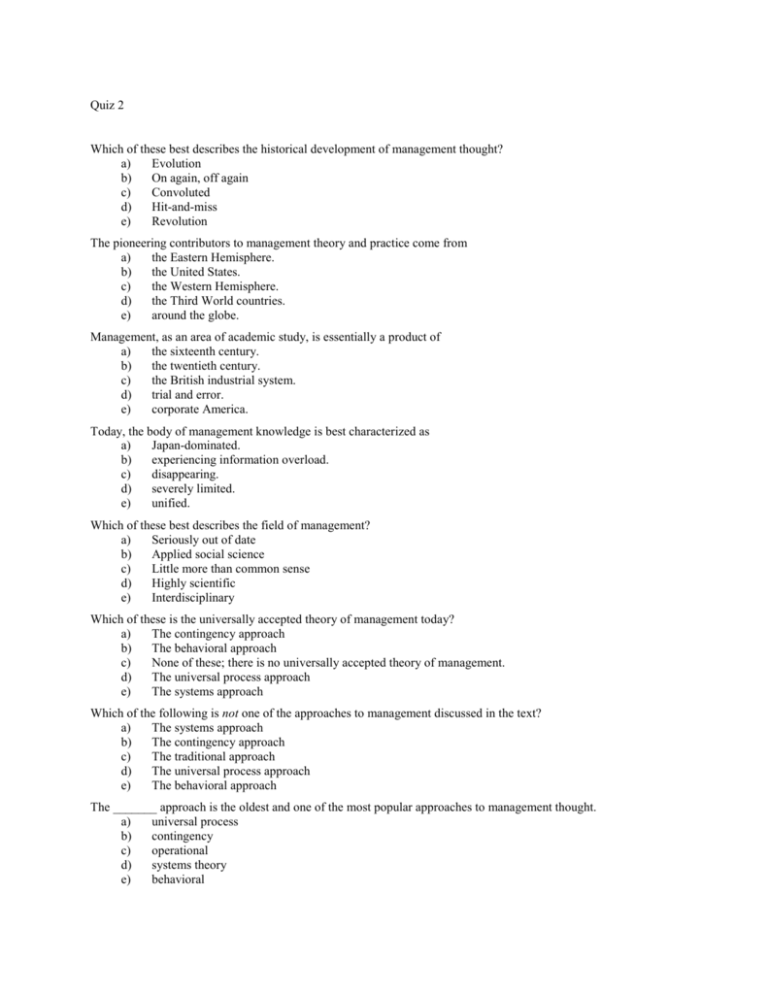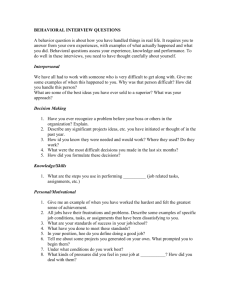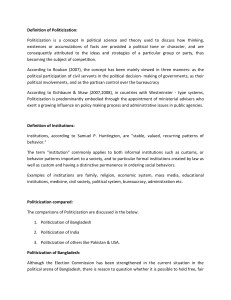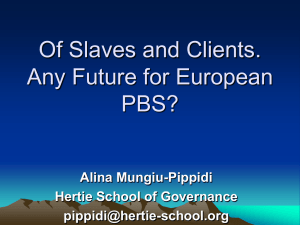File - College of Management and Accountancy
advertisement

Quiz 2 Which of these best describes the historical development of management thought? a) Evolution b) On again, off again c) Convoluted d) Hit-and-miss e) Revolution The pioneering contributors to management theory and practice come from a) the Eastern Hemisphere. b) the United States. c) the Western Hemisphere. d) the Third World countries. e) around the globe. Management, as an area of academic study, is essentially a product of a) the sixteenth century. b) the twentieth century. c) the British industrial system. d) trial and error. e) corporate America. Today, the body of management knowledge is best characterized as a) Japan-dominated. b) experiencing information overload. c) disappearing. d) severely limited. e) unified. Which of these best describes the field of management? a) Seriously out of date b) Applied social science c) Little more than common sense d) Highly scientific e) Interdisciplinary Which of these is the universally accepted theory of management today? a) The contingency approach b) The behavioral approach c) None of these; there is no universally accepted theory of management. d) The universal process approach e) The systems approach Which of the following is not one of the approaches to management discussed in the text? a) The systems approach b) The contingency approach c) The traditional approach d) The universal process approach e) The behavioral approach The _______ approach is the oldest and one of the most popular approaches to management thought. a) universal process b) contingency c) operational d) systems theory e) behavioral Which approach is also known as the functional approach to management? a) Systems approach b) Behavioral approach c) Excellence approach d) Universal process approach e) Operational approach The universal process approach assumes that a) it is more difficult to manage public organizations. b) small organizations are hardest to manage. c) management is not practiced in small organizations. d) managing in public organizations and managing in private organizations are completely different. e) managing in public organizations and managing in private organizations are basically the same. _______ involves “who does what.” a) Span of control b) Authority c) The specialization of labor d) The chain of command e) Communication Which of the following refers to who is ultimately responsible for getting things done? a) Specialization of labor b) Command center c) Communication d) Authority e) Delegation What most influenced Frenchman Henri Fayol's management writings? a) Chester I. Barnard b) His experience as an administrator c) His 30 years as a college professor d) His military experience e) His wife, Mary Parker Follett What are the two key pressure points for managers when they deal with the political-legal environment? a) The politicization of management and increased personal accountability b) Political promises and voter turnout c) Increased personal accountability and the politicization of consumers d) The politicization of employees and decreased personal accountability e) Decreased personal accountability and the politicization of management What should managers use if they want to identify and respond in a timely manner to social and political shifts? a) Issues management b) Political risk assessment c) Trial balloons d) Protectionism e) Legal auditing Its emphasis on systematic preparedness for _______ is issues management's main contribution to good management. a) technological and economic action b) legal and technological action c) competitive and global action d) social and political action e) action related to internal effectiveness and efficiency ________ is one of the three responses on management's political response continuum. a) Negotiation b) Reactive c) d) e) Reconciliation Problem solving Arbitration The head of a cosmetics company who takes a "watch and wait" attitude toward proposed federal legislation limiting the use of additives would fall into which category on the political response continuum? a) Passive b) Reactive c) Neutral d) Proactive e) Entrenched When a petroleum company replaced its underground storage tanks two years before the government's deadline, it qualified for a(n) _______ position on the political response continuum. a) proactive b) anticipatory c) neutral d) reactive e) entrenched Which of these is the study of how scarce resources are used to create wealth and how that wealth is distributed? a) Ecology b) Management c) Sociology d) Finance e) Economics






